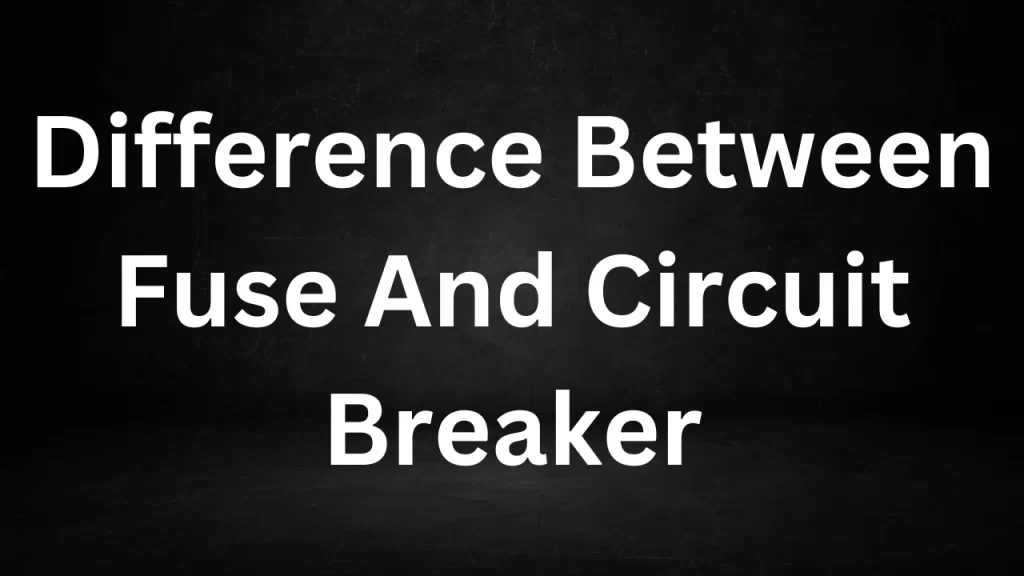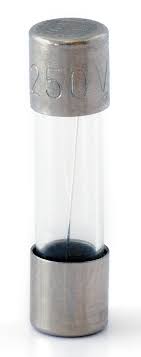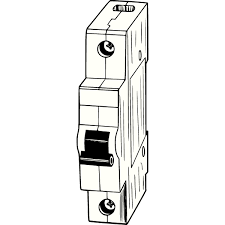Tag: differentiate fuses and circuit breaker
Difference Between Fuse And Circuit Breaker
Difference Between Fuse And Circuit Breaker: Fuses and circuit breakers are both electrical safety devices designed to protect electrical circuits from overcurrents and short circuits, but they differ in how they operate and their resetability. Here’s a comparison of the key differences between fuses and circuit breakers:

Difference Between Fuse And Circuit Breaker
1. Operation:
- Fuse: A fuse is a simple, one-time-use device that consists of a thin wire or metal strip that melts when exposed to excessive current. When the current exceeds a certain threshold, the fuse wire melts, breaking the circuit and disconnecting the power.
- Circuit Breaker: Circuit breakers are reusable devices that can be manually reset after they trip. They use an electromechanical mechanism to detect overcurrent or short-circuit conditions. When a fault occurs, the circuit breaker trips, opening the circuit to interrupt the current flow.
2. Resetability:
- Fuse: Fuses are not resettable. Once a fuse melts and interrupts the circuit, it needs to be replaced with a new fuse of the same rating.
- Circuit Breaker: Circuit breakers are resettable. After they trip due to a fault, they can be reset by flipping the breaker’s switch back to the “on” position, restoring power to the circuit.
3. Cost:
- Fuse: Fuses are generally less expensive than circuit breakers, but the cost adds up over time since they need to be replaced each time they blow.
- Circuit Breaker: Circuit breakers are more expensive upfront but offer long-term cost savings because they can be reset and reused.
4. Response Time:
- Fuse: Fuses typically have a faster response time than circuit breakers since they react almost instantly to overcurrent conditions.
- Circuit Breaker: Circuit breakers may have a slightly slower response time because of the mechanical components involved, but they are still effective in protecting against overcurrents.
5. Sensitivity:
- Fuse: Fuses are generally less sensitive to minor overcurrents and may not trip as quickly as circuit breakers in response to small faults.
- Circuit Breaker: Circuit breakers can be adjusted to different levels of sensitivity, allowing for better protection against a wider range of faults.
6. Lifespan:
- Fuse: Fuses have a limited lifespan and need replacement each time they blow.
- Circuit Breaker: Circuit breakers have a longer lifespan and can be used repeatedly as long as they are not damaged.
In summary, fuses and circuit breakers both serve the essential purpose of protecting electrical circuits, but they differ in their operation, resetability, cost, response time, sensitivity, and lifespan. The choice between them depends on the specific requirements of the electrical system and the desired level of protection.


Read More
- Difference Between Electromagnet And Permanent Magnet
- Blind Visually Impaired Optical Low Vision Aids
- Bar Magnet As An Equivalent Solenoid
- Equivalent Weight of KMnO4
- Molecular Mass of Na
Frequently Asked Questions (FAQs) Difference Between Fuse And Circuit Breaker
1. What is a fuse, and how does it work?
A fuse is an electrical safety device that consists of a thin wire or metal strip. It works by melting when exposed to excessive current, breaking the circuit and disconnecting the power.
2. What is a circuit breaker, and how does it work?
A circuit breaker is an electrical safety device that uses an electromechanical mechanism to detect overcurrent or short-circuit conditions. It trips by opening the circuit to interrupt the current flow.
3. Can fuses be reset after they blow?
No, fuses are one-time-use devices and cannot be reset. They need to be replaced with a new fuse of the same rating.
4. Can circuit breakers be reset after they trip?
Yes, circuit breakers are resettable. After they trip due to a fault, they can be manually reset by flipping the breaker’s switch back to the “on” position.
5. Which is more cost-effective, fuses, or circuit breakers?
Fuses are generally less expensive upfront than circuit breakers. However, circuit breakers offer long-term cost savings because they can be reset and reused, whereas fuses need replacement.